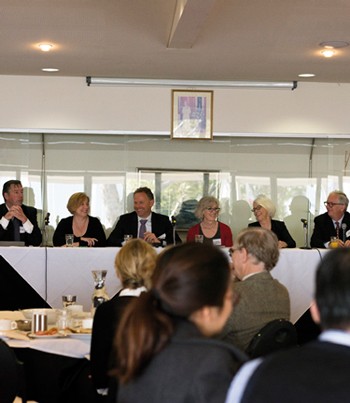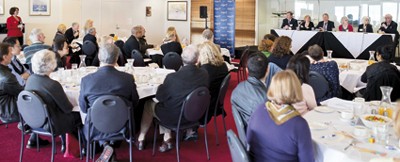It takes a vilage to train to train a doctor … is it working?
 It was a provocative title and it elicited some provocative discussion at our 10th Doctors Drum forum. The term ‘dud’ itself came under scrutiny but the meeting agreed with our surveyed doctors and the medical trainers who had been in our ear – that underperforming doctors were getting through the system.
It was a provocative title and it elicited some provocative discussion at our 10th Doctors Drum forum. The term ‘dud’ itself came under scrutiny but the meeting agreed with our surveyed doctors and the medical trainers who had been in our ear – that underperforming doctors were getting through the system.
So was it having an effect on the image of doctors in the community and how does the profession propose to deal with ‘dud’ doctors? The answers were complex and with several trainers, a lawyer, a recent postgraduate and a consumer rep on the panel, the ideas came from many angles, however, if one word summed up the entire discussion it was communication – both on a personal and professional level. Without good communication skills, doctors would not be “competent, caring, compassionate or resilient”.
The panel thought doctors’ good image was safe but there was no room for complacency. The answer really depended on who you asked. Patients almost universally would say ‘no’, especially those who interacted well with their doctor, whereas aggrieved patients or the media would say ‘yes’. But doctors subject to a complaint perhaps beat themselves up too much over just one unsatisfactory patient interaction: “High achievers and high performers can be very self-critical when someone responds to them in a difficult way,” said one panellist.
And to solve the problem led us back to training.
Med School – the Weeding Process
Ideally, it is at medical school the wheat from the chaff should be sorted. One senior trainer and panellist said high demand for places meant the rigorous stages of selection, instruction and assessment eliminated many candidates – but there was always room for improvement.
Communication skills were at the heart of the current selection process. The UMAT test which gauges interpersonal skills, empathy and personal understanding was tripping up many of the 1200 applicants for the 60 places at one medical school.
And responding to an earlier Doctors Drum meeting when it was suggested that potential financial and legal consequences of failing non-performing students were frightening some trainers off, he said students would fail if they “demonstrated their inability to perform or were inappropriate” but every attempt to remediate poor students would be made.
The room was asked what the qualities were of a good doctor.
SMART, COMMUNICATORS, CARING, ADAPATABLE, PASSIONATE, ENERGETIC, RELISIENT, CLEVER, RESPECTFUL, DEDICATED were the responses.
So how, asked one guest, do universities “find people with that spark and passion for continuous learning; who will be self-stimulated rather than being driven by things such as quotas and revalidation, because those are the doctors we really want.”
A director of medical education on the panel believed we shouldn’t undersell the current selection processes, they were rigorous and – “what we are ending up with is a cohort of high-achieving people, who mostly perform at a wonderful level.” He predicted that in the future there would be more multi-station interview panels to get the widest possible view of the candidate.
This was music to the ears of the consumer advocate, who thought a consumer rep should be on the selection panel so that doctors of the future will not only be “clever people who can pass tests but people who can deal with the whole person they will eventually be seeing and who will also be able to ask for help if they need it.”
She went on to call for medical students to have greater access to real patients with real problems before they left the classroom. From her experience, a lack of courtesy and helpfulness and poor health communication were responsible for most consumer complaints. By giving students exposure to patients early, she said, would help them learn to listen and understand the person sitting in front of them.
Recent figures which showed Australia enjoyed one of the highest doctor-patient ratios in the world brought one doctor to his feet questioning the validity of our apparent shortage of doctors. The response from the panel suggested that WA was adrift from doctor numbers in the Eastern States and we also had a serious distribution problem.
Apparently there’s a ratio of four GPs in the Western suburbs to one in the Eastern Suburbs and rural and remote areas were still seriously under-doctored. “We need to find appropriate ways to channel post-grad training in such a way that working as a generalist (surgeon, physician or practitioner) in those areas is seen as a suitable career.”
 Postgraduate Training – Crunch Time
Postgraduate Training – Crunch Time
The critical clinical years of training became the hot topic of the morning – it was in these years the cracks in the training system and the flaws in the individual would become most apparent. So how are these flaws identified, remediated or removed?
One young doctor on the panel said the increasing numbers of post grads was severely reducing the clinical opportunities for junior doctors, which in turn led to early commitment to training pathways because of the pressure on RMO jobs. Early honest mentoring was paramount if trainees were to address their flaws early, before training starts in earnest and mediation is required.
One doctor questioned the all-round preparedness of junior doctors. She had “grave concerns” about the reduction of face-to-face training with a growing online focus, and important areas of medicine were not getting the attention they deserved.
A hospital trainer on the panel said there were gaps in the system where junior doctors were more likely to see a lung transplant than someone who needs a pap smear. “Some of that training and how registration is achieved will need to be defined because exposure to some procedures in a tertiary hospital will be quite limited, particularly as hospitals become more specialised.” He added community medicine as part of an internship was bound to happen. For now, rotation to hospitals around the state is being used to help close those gaps.
Need for outcomes
A panellist who had been an engineer and a maths teacher before doing medicine told the forum that much could be learnt from the structure of teacher education. The competition for clinical exposure and experience meant a junior doctor could graduate without experience in a number of areas.
While some were not “game-changers” she felt that every rotation needed to have demonstrable outcomes. “We need to support our junior doctors by giving them some structure. Standardised learning will produce great outcomes for our doctors. The struggling learner, whether it be in maths or some element of clinical training, needs scaffolding.”
Team-based structure was lauded by the lawyer on the panel who said it was the very thing that held up when things went awry.
 Trust and team building
Trust and team building
One doctor voiced his concern about the reluctance of junior doctors to seek help recounting just 6% of 60 junior doctors present at another forum said they would approach their supervisor for support. How, he asked, could that culture be changed to encourage people who needed help to seek it from the right people?
Mentors and peer support were the common suggestions along with regular feedback from consultants and registrars.
Is it time for 360 assessment?
[360 is a form of assessment where feedback on an employee’s performance is elicited from subordinates, peers and supervisors, as well as a self-evaluation by the employee themselves.]
The panel generally favoured the process but it needed to be done sensibly and carefully to ensure it didn’t become destructive. For one GP on the panel, 360 gave him insight into how others perceived his practice. “Understanding what it means to the person you’re treating ensures that you are giving appropriate care.”
However, it does require training. The lawyer on the panel said delivering feedback posed challenges for trainers. Done well the 360 scenario supported the messenger (“we’re here to help”) but there are legal challenges with bullying and harassment ever in focus.
Training in general practice was brought into sharp focus with a doctor in the audience asking how it could be made more appealing to graduates rather than what he described as a default position.
A representative from WAGPET made no bones about the fact that GP training selection was tough and uncompromising. Of the 1500 positions advertised this year, 170 remain unfilled because the quality of applicant was not there. “General practice is not the sewer for people who think they can get a job there if they can’t get a job anywhere else,” she said.
Drawing students to general practice is an aim of the university trainer on the panel. “Most of the training is done in tertiary hospitals but most of the medicine is delivered in the community. Students need to spend more time with GPs.”
Continuous Learning – the Supervisor
Lack of support for overseas trained doctors (OTDs) was raised and the questioner asked if complaints were proportionally higher for OTDs and should we be looking to hire more Australian-trained doctors?
Interesting, the three panellists who tackled this thorny issue didn’t have any facts or figures. One said we needed to do more training: anecdotally no one should be driving a taxi because they failed the exam and English as a second language should not be a barrier. Another panellist with rural experience said they preferred the term “unfellowed OTDs” – “we do have a problem in some rural and remote areas, which are hardest to staff, we take the doctors who are least experienced from overseas” – whereas greater respect to communities is shown if you can find the right doctor for the right area, who can practice with safety.
Learning doesn’t stop at fellowship, though creating a culture of learning starts much earlier. Supervisors have an enormous role to play in the pursuit of standards and lifelong learning, according to one panellist. “Nurturing, professional development, supervision and passion are more important for shaping the future career of doctors than anything.”
Performance management is a skill not many doctors are well trained in, said one panellist. Colleges are now mandating training for supervisors and a recent conference was convened to establish networks and peer support for GP supervisors. A good supervisor needs training not to be hasty in passing judgement and assessment must be spread across not just professional domains but other domains as well.



